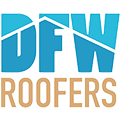As mentioned in our insurance series, there are different types of insurance adjusters, each with key differences. An adjuster works with your insurance carrier to estimate how much will be owed to repair damages. It’s a dangerous job that often involves climbing on...
- What should I do if my roof is damaged by a storm?
Before anything else, you should prioritize your own safety. Remember: wet roofs, tall ladders, and high-stress situations don’t mix well. If you lack the experience to climb, scale, and cover or plug up damage – don’t do it.
After all, we’re just a call away. Our team has experience working on roofs of all types and in all conditions. You can trust us to get on the scene promptly, cover any exposed areas with tarps or other waterproof materials, and even guide you through the insurance claims process if needed.
- Do you handle insurance claims for storm damage?
Absolutely. The DFW Roofers team has a long and successful history working alongside insurance to help homeowners repair their properties after storms. Whether you need a consultation or are just looking for a well-versed contractor to get the job done, don’t hesitate to reach out.
- Is my property damage claim-worthy?
What makes damage claim-worthy is determined by your insurance policy. For instance, if your roof is damaged because it hasn’t been properly maintained, then it’s unlikely to be claim-worthy. However, if a hailstorm caused the damage, and your policy covers this event, then it will likely be claim-worthy.
- Is it illegal to waive an insurance deductible in Texas?
Yes. As the Texas Department of Insurance (TDI) says, “It is illegal for contractors or roofers to offer to waive a deductible or promise a rebate for all or part of a deductible.” And waiving deductibles is often a sign that a contractor is more interested in overcharging insurance than providing necessary repairs.
- Is my roofer scamming me?
It’s no secret that Texas’ roofing market has its fair share of shady activity. The biggest red flag is any contractor offering to waive your deductible or to “make up for it” by providing gifts. This is illegal, and it indicates that they may be more interested in overcharging your insurance than fixing your roof.
- Why was my roof claim denied?
The most common reasons a roof claim is denied is due to a lack of coverage, a lack of maintenance, damage due to basic wear and tear, or the homeowner filing the claim too late.
- How does insurance estimate repair costs?
Insurance adjusters often use a program called Xactimate to estimate repair costs. Because Xactimate uses real-time labor and material costs, it’s easier to standardize estimates between contractors and adjusters. If there’s a discrepancy, it’s likely due to an item being added or removed.
- What’s the difference between in-house, third-party, and public adjusters?
In-house adjusters are employees of your insurance carrier, while third-party adjusters are hired on a case-by-case basis, often when carriers are overwhelmed and need outside help with claims. You can think of a public adjuster as a homeowner advocate. They often charge a fee to help homeowners negotiate their claims.
- What are the major types of insurance carriers in Texas?
The Texas Department of Insurance (TDI) suggests that homeowners buy insurance from companies that the TDI has licensed. We can generally organize carriers by national carriers, which tend to offer widespread coverage but may lack personalization; regional carriers, which may tailor coverage to local risks; and surplus lines carriers, which tend to cover high-risk, hard-to-insure properties.
- My roof is damaged! How do I initiate an insurance claim?
Start by calling your insurance carrier, and they’ll walk you through the steps and schedule a time for an adjuster to perform an inspection. If your carrier determines if your damage is claim-worthy, a payout will be determined.

